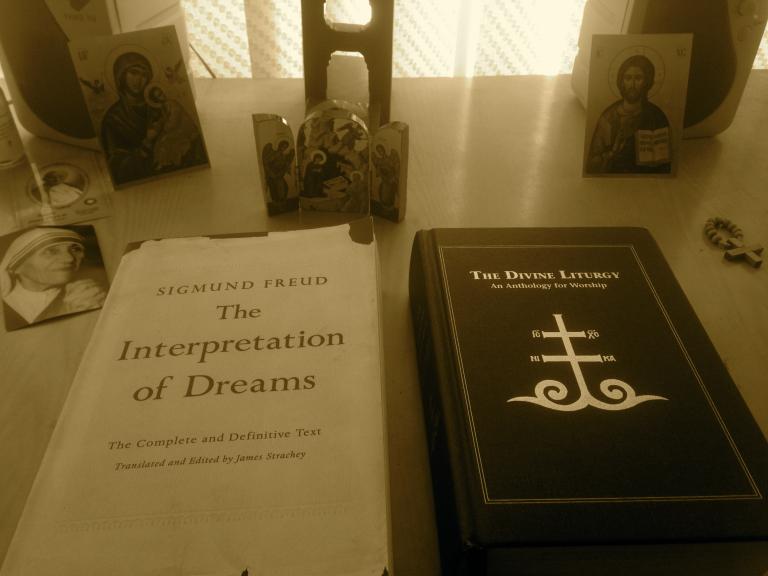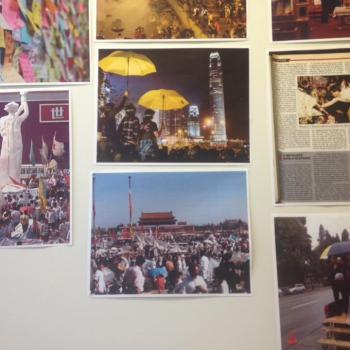
Last night I had the strangest of dreams.
The scene begins with our temple in Richmond packed. For some reason, I do not know many of these people, and it is not the recent chrismation service that we celebrated for my dear new friends who were just received into the Kyivan Church. But we do have a kleros, and the newly received neophytes are in it. I am the cantor. My spiritual father is celebrating the liturgy, swinging his thurible with all the gymnastics that Byzantine training will afford. Inexplicably, there is a concelebrant. He is from the Latin Church, presumably Jesuit like my spiritual father, and in hindsight, looks a lot like René Girard.
Everything was going so well as the Enarxis began, the Great Litany took off, and we sang in the Kyivan tradition Psalm 102 ‘Bless the Lord’ as the first antiphon. But as we began to intone the ‘Glory’ that leads into the Hymn of Holy Athanasius of Alexandria (‘Only-Begotten Son’), my spiritual father steps out to take a call. I should have known it was a dream because my spiritual father in real life does not have a functioning cell phone. But he was paged and took off outside. For some strange reason, we could see him incensing outside. This is another sign that it was a dream. These are things my spiritual father would never do in real life. Plus, to my knowledge, he is never on call. He’s not the hospital chaplain. My biological father is.
The new Latin guy goes out with him and returns. As we begin to sing the Hymn of Holy Athanasius, he cuts us off. He begins to preach. We stand there aghast. Our guests, whom we came to understand were a bunch of Latins and evangelicals, did not seem fazed, though. They sat down and began to listen.
Suddenly, someone alerts the Girard lookalike that he’s literally disrupted the liturgy and skipped the entire Little Entrance, not to mention the readings on which his homily is presumably based. He has an emotional breakdown. Inexplicably, he falls into my arms, and I embrace him as he sobs. As he sobs, I reassure him: You were probably nervous, having never done a Byzantine liturgy before. It’s ok. Trust the people. Trust me, as I cantor. Trust us. We know the liturgy. As I say these words of reassurance, I look up at my kleros. They are waving hand signals telling me to cut it out, time out, as I am exaggerating my advertisement about their knowledge of the liturgy. I reflect that this is probably true. How else was I, the member of the kleros who struggles the most with pitch and tone and has no vocal or liturgical training, made the unofficial de facto cantor, even when I am away most of the year in Chicago?
In any case, the priest pulls it together, and I ask him where he’d like to start again. Would we like to start at the Hymn of Holy Athanasius? Or would we like to take the Little Entrance as read because he jumped the gun and skip even past the Trisagion to the readings? He mumbles something, I decide to let him off easy because he doesn’t know what any of these things are, we start with the prokeimen.
Our regular reader intones the prokeimen in tone 6: Save your people, O Lord, and bless your inheritance. I leap into action, conducting in my closest Ilya Galadza impression – for those who wish to know the drill at St Elias Brampton, Ilya is the cantor extraordinaire who jumps on the downbeat and gives the clearest instructions with his hands. The reader then chants the verse.
But as I bring the congregation back into the prokeimen, I start feeling a bit woozy. The whole scene begins to blur, spiral, silence. And then I wake up, and behold, it was a dream.
In the public words of one of my more regular but very critical readers, more information about the ‘growing number’ of our ‘much ballyhooed’ Kyivan Psychoanalysis Study Group can be found here.












